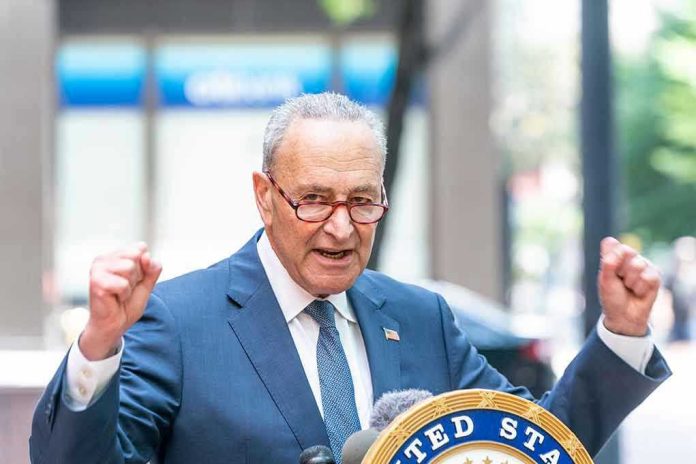
Eight Senate Democrats just handed Republicans a shutdown victory while their own party leader watched helplessly from the sidelines, triggering the most serious leadership crisis Chuck Schumer has faced in his tenure.
Story Highlights
- Eight Senate Democrats broke ranks to end the government shutdown, defying party leadership
- Progressive lawmakers and activist groups are publicly demanding Schumer’s resignation
- The deal abandoned Democratic demands for guaranteed ACA subsidy extensions
- House Minority Leader Jeffries supports Schumer but calls the agreement a “partisan Republican spending bill”
- The rebellion exposes deep fractures within the Democratic Party over strategy and leadership
The Revolt Against Schumer Explodes Into Public View
Democratic lawmakers unleashed unprecedented public criticism against Senate Minority Leader Chuck Schumer after eight Senate Democrats provided Republicans the votes needed to advance a shutdown deal. Progressive groups Our Revolution and Indivisible immediately called for Schumer’s resignation, while Representative Seth Moulton declared the party needs “new leadership.” The backlash represents the most serious challenge to Schumer’s authority since he became Senate Democratic leader.
Representative Jared Moskowitz amplified the anger on social media, sharing viral “trainwreck” imagery to characterize Schumer’s handling of the negotiations. Representative Ro Khanna joined the chorus of critics, arguing that Schumer either orchestrated the capitulation or proved incapable of maintaining party discipline when it mattered most.
The Deal That Fractured Democratic Unity
The bipartisan agreement to reopen the government contained none of the Democratic priorities Schumer had initially demanded. Republicans successfully rejected Schumer’s Friday proposal for a one-year extension of Obamacare subsidies, forcing Democrats to settle for only a promise of a future Senate vote. The eight Democratic defectors provided the crucial votes to overcome a filibuster, leaving Schumer to cast a symbolic “no” vote that satisfied neither his critics nor his defenders.
House Minority Leader Hakeem Jeffries attempted damage control by publicly backing Schumer while simultaneously denouncing the deal as a “partisan Republican spending bill.” This delicate balancing act highlights the impossible position Democratic leaders find themselves in, trying to maintain unity while their own members openly revolt against the agreed strategy.
Republicans Celebrate Democratic Disarray
Senate Republican leadership under John Thune successfully exploited Democratic divisions to secure their preferred terms. By rejecting Schumer’s healthcare proposals and maintaining pressure during the shutdown, Republicans forced the Democratic defections that ultimately broke the stalemate. The GOP strategy of patience and unity stood in stark contrast to the public fracturing within Democratic ranks.
The Republican victory extends beyond the immediate shutdown resolution. They demonstrated that Democratic leadership cannot control their own caucus when facing sustained pressure, potentially emboldening future GOP negotiating strategies. The public nature of Democratic criticism provides Republicans with ready-made talking points about their opponents’ inability to govern effectively.
Long-Term Implications for Democratic Leadership
The rebellion against Schumer signals deeper ideological fractures within the Democratic Party that extend beyond this single negotiation. Progressive activists argue that party leadership consistently fails to fight aggressively enough against Republican priorities, while moderate Democrats worry that hardline positions make meaningful legislation impossible. These competing visions create an almost impossible balancing act for any Democratic leader.
The episode establishes a dangerous precedent for future negotiations, showing Republicans that sustained pressure can fracture Democratic unity and produce favorable outcomes. If Schumer cannot maintain caucus discipline during high-stakes showdowns, his effectiveness as a negotiator becomes severely compromised. The very public nature of this revolt may encourage similar challenges to his authority in future legislative battles, potentially paralyzing Democratic strategy when unity matters most.
Sources:
Schumer, Dems unveil alternative shutdown plan, ask 1-year extension Obamacare subsidies
‘Trainwreck!’ More Democrats Fume at Shutdown Deal, Call for Schumer’s Head
Jeffries backs Schumer as Democrats fume over shutdown deal



